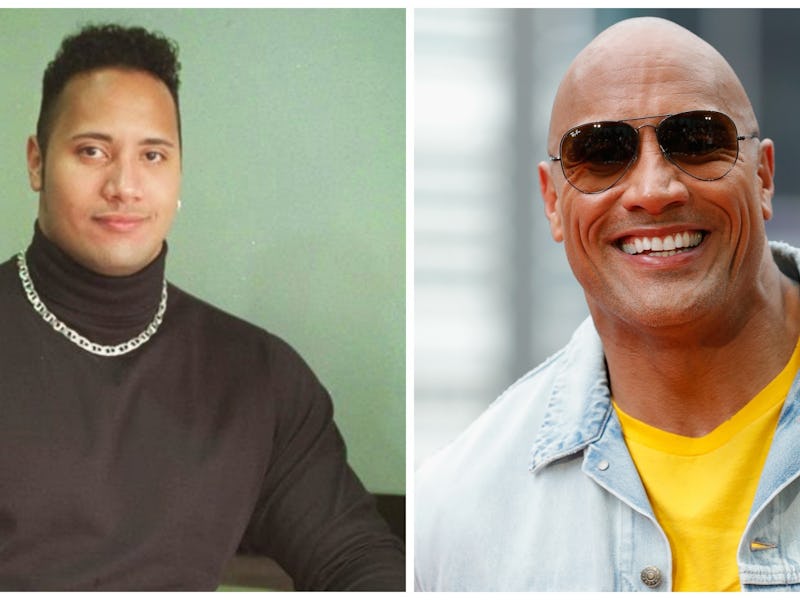Don't Blame Your Mom's Dad for Male Pattern Baldness
Leave Grandpa's noggin out of it.

One day, a guy’s got a full head of tousle-able, luscious hair. The next, that same guy looks into a mirror and sees a reflection of himself with a receding hairline, skin creeping out where hair used to grow wild.
It’s male pattern baldness, and while a dude might be tempted to blame his maternal grandfather for the curse of his receding mop, the genetic truth is way murkier.
Balding is actually the result of a very complicated mix of biological and environmental factors. This makes it hard to predict who will go bald, let alone how to turn back the clock on America’s follicles. Thanks to scientific breakthroughs, however, we’re getting closer than ever to unlocking the mysteries of The Rock’s seductive scalp — and your own, much less attractive skull.
That hasn’t stopped scientists and hardcore hairdressers from capitalizing on hair loss, officially known as alopecia, with the male pattern baldness industry cashing in on a $3.6 billion dollar industry dedicated to fighting it with wigs, transplants, chemical treatments, and lots and lots of prayers.
Perhaps this fanny pack now contains all of The Rock's precious lost locks.
The Many-Headed Beast
An old adage states that you can predict your own fate based on your mom’s dad and his hair, but new research is showing this to be overly simplistic. Yes, genes related to hair loss are in fact on the X sex chromosome, and therefore passed down to you by your mother — but there are a bunch of other factors at play.
In some cases, hair loss can be brought on by stress or poor diet, autoimmune diseases, and pharmaceuticals. But these are all rare. The majority of hair loss is tied to male pattern baldness, a quasi-hereditary trait responsible for the majority of hair loss in men. Part of it is your mom’s X chromosome, but numerous other genes, hormones, and even your immune system functions are involved.
Let’s start with testosterone. While everyone has it coursing through their body, men have a lot more testosterone than women. The sex hormone is important for many reasons, including encouraging the development of male genitals, heart health, and the like. But in human hair follicles, testosterone can be all-too-easily transformed into dihydrotestosterone, which shrinks the follicle and stops hair from growing. That’s part of why more more men experience hair loss than women, who have less testosterone at work in their bodies — and on their scalps.
Our immune system may also be a key player when it comes to hirsutism. In May, researchers published a report in the journal Cell that showed T cells can change how follicles work for the worse. Apparently, T cells have a tight pact with the stem cells that allow for hair regeneration. When the T cells living in the skin on your head are disrupted, so is hair growth. While the results were most clearly tied to a variety of hair loss known to result from autoimmune disorders, the researchers think T cells could shape male pattern baldness, too.
Still, genetics are probably the single most crucial components of male patterned baldness — but no one understands exactly how. One of the most comprehensive studies on this factor, published in Nature Communications in March, looked at data compromising more than 10,000 men with early onset hair loss and an equal number of controls. They found a whopping 63 different spots scattered throughout human DNA that can contribute to male pattern baldness. That’s a lot of different genes working together — far too many to allow for an easy genetic solution to thinning hair.
So About the Hair on Your Head
All of this goes to show hair loss is a lot more complicated than whatever’s going on with your grandpa’s noggin. But it’s also extremely common. In fact, as many at 85 percent of men go on to experience some hair loss over the course of their lives, with increased prevalence among Caucasian men.
It also has to be said that though people may spend small fortunes trying to combat it for aesthetic purposes, there’s nothing wrong with being bald. In fact, some evolutionary biologists theorize that in the distant past, premature baldness made men stand out to potential mates. Baldness is sometimes associated with age and wisdom, so a 20-year-old losing his hair may have looked distinguished instead of decrepit. So as these theorists and Tooth Fairy’s Dwayne ‘The Rock’ Johnson can attest to, there might be something to be said for wholeheartedly embracing that smooth-shaven life.
So skip the Rogaine and stay confident, baldy buddy.